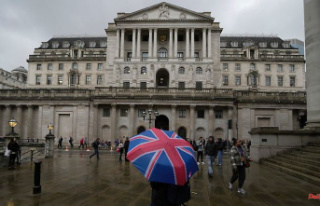Energy prices in particular are driving inflation to the highest level in over 70 years. However, the cost of food is also increasingly contributing to the high rate. In October, this rises to 10.4 percent. The end of the flagpole may not have been reached yet.
Fueled by high energy and food prices, inflation in Germany has climbed to its highest level since 1951. Goods and services cost an average of 10.4 percent more in October than a year earlier, the Federal Statistical Office confirmed an earlier estimate.
In September, the inflation rate was still 10.0 percent. "The main reasons for the high inflation are still enormous price increases for energy products," said the President of the Federal Statistical Office, Georg Thiel. "But we are increasingly seeing price increases for many other goods and services." An example of this is the development in food: consumers had to pay an average of 20.3 percent more for it than in October 2021. Edible fats and oils (up 49.7 percent), dairy products and eggs (up 28.9 percent) became significantly more expensive ), vegetables (plus 23.1) and bread and cereal products (plus 19.8).
However, the number one price driver remains energy as a result of the Russian war against Ukraine: it cost an average of 43.0 percent more than a year earlier. The reduction in value added tax from 19 to 7 percent for natural gas deliveries and district heating is likely to have prevented an even stronger increase.
Household energy rose particularly sharply by 55.0 percent: the price of natural gas more than doubled to 109.8 percent, and the price of district heating rose by 35.6 percent. Heating with other energy sources also cost considerably more: the prices for firewood, wood pellets or other solid fuels increased by 108.1 percent, and those for light heating oil were 82.8 percent higher. 26.0 percent more was required for electricity. 22.3 percent more had to be paid for fuels such as petrol.
Consumers must be prepared for further price increases in the coming months. In October, too, every second company planned to ask customers to pay more in the near future, as the Munich Ifo Institute found out in its monthly survey. The economists expect an average rate of inflation of 7.4 percent for the coming year. This year it should be 8.0 percent.












